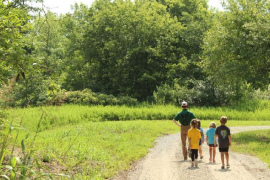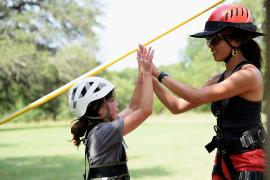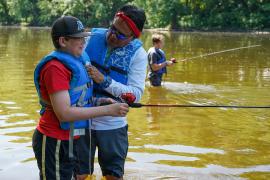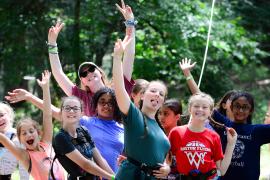The interview process is just that . . . a process. My strategy is to weed out candidates that will not be supportive to our program. Each step along the way, there is opportunity to move forward together with applicant or for either of us to part ways. When they make it through the entire process, they normally make a great staff member.
Things to talk about in an initial short phone/video interview:
After brief small talk referencing something from their application, there are specific things you should find out.
-
Dates available? Critical! If they are not available for dates you need, then there is no reason to go forward. Sometimes, applicants will share different information on the phone than they put on their application.
-
Find out their desired salary. Critical! If their expectations are more than you can afford, there is no reason to move forward. Normally I ask them first what they are expecting, which lets me know where they stand financially.
-
However, always make them aware of all the non-financial benefits of working at camp. Room and board, laundry, resume builder, leadership opportunities, growth and development of others, making a difference, activities they will get to do, beautiful area of the country they get to be in, and it is so much fun!
If they make a decent first impression and dates and finances work, then schedule an in-person or video interview.
In person/video interview — use this opportunity to get to know the candidate like a new friend.
-
If the interview is at camp, take the candidate on a tour first then sit down and chat. This allows you to see their stamina, what things around camp excite them, and learn more about their personality.
-
Share expectations of your staff — mostly things that are available on the website like standing for long periods, being outside, being available and present for campers, and so on.
-
After the tour, be prepared for where you are going to sit …couches, porch of dining hall, office, or conference room. Have the area prepared ahead of time and be intentional about seating and comfort, or lack thereof.
-
Find out about their experiences working with children (e.g., babysitting, working in youth recreation or youth ministry types of settings). Some of this may be in their application; however, it is better to hear them say it, rather than just reading about them.
-
Learn about specifics from their personal background: What do their parents do for work? Siblings? What kind of relationship do they have with their parents/siblings, their friends. Camp is unique — we must get to know our staff. I also like to find out if they have been active in clubs or sports at school, the places they’ve lived, and what is their passion — things to get to know the candidate better.
-
Watch their body language. Make them comfortable. Remember that people like people like themselves . . . you can mirror their body language or engage other nonverbal communication that demonstrates active listening.
-
Take notes. It sends a message that you value what they are saying.
-
It’s important to sell them on your camp without forcing; it has to be the right fit — the right fit for both the applicant and camp.
-
If you are holding a video meeting, share your screen and show a map of camp. People in today’s world are very visual. It’s also fun. Show a camp video or pictures of staff with campers from previous summers. Find ways to connect.
-
If you hold an in-person interview, offer them a glass/bottle of water if they did not bring a drink bottle.
-
Some will ask how the schedule works . . . be prepared with a sample schedule and information from a typical day.
-
Talk to them about the support we provide to staff regarding orientation, schedules, child development sessions, staff training, resource guides, and so on. You want them to know that you will prepare them for the job ahead.
-
Talk about opportunities for training as a lifeguard, ropes course leader, archery instructor, and other program areas. These can be presented as value-added elements of working at camp.
-
Explain the need for a background check and the types of things we look for. Ask them if anything will come up on background check. Let them know the typical timeline and the let them know as soon as possible the results of the background check. The process makes some applicants nervous even if they have nothing to worry about.
-
Make sure they understand that working at camp will benefit them and their future career or lives. Give them the Project Real Job handouts to help make this point.
-
Some will ask for a brochure or other written camp information to take with them; be prepared with a packet of commonly asked questions and information.
-
At the end of the in-person or video interview, always try to give some type of task to the potential staff member and set a deadline to complete it. This might include submitting more information about references, program ideas, a note telling us that they feel like they are right for us, and so on.
Post interview:
Always look for staff to follow up in a timely fashion based on your earlier requests for additional information (e.g., provide additional information about references, submit a new program idea).
-
Once they follow through, call them, formally offer them the job, and confirm dates and finances.
-
If all the required references, documents, and background checks have been received, send a contract to the potential staff member with an expected return date.
-
Make sure to add new staff to all social media and welcome them to the family!
-
Invite staff to any pre-camp appropriate events.
If they made it through the three phases of hiring, they are going to be a great staff member!
“H” Rothenberg started his camp experience as a camper in 1975, then moved through the ranks of counselor, unit head, assistant director, and director at private and nonprofit camps in the Midwest. He has a degree in elementary education and has coached and directed basketball teams/leagues at all grade levels. In 1999 along with wife Libby, they accomplished their dream of owning and operating their own camp in Charlottesville, Virginia.
Recently, "H" has turned to help other youth development programs. Through his Camp Coach consulting (campcoach.com), "H" supports private and nonprofit camps throughout the country. He can be reached at 434.906.0112 or [email protected].
“H” has been a longtime volunteer with ACA and currently serves on the camp director sub-committee of ACA’s Task Force, Project Real Job.
Photo courtesy of Park Slope Day Camp in Brooklyn, New York
The views and opinions expressed by contributors are their own and do not necessarily reflect the views of the American Camp Association or ACA employees.




